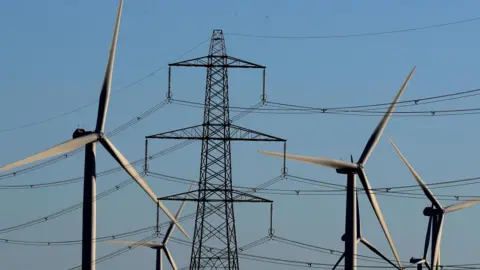 PA
PAWind and solar farms that are ready to be built would be allowed to jump the queue for a connection to the UK’s electricity system under government plans.
All energy schemes which need a connection to the National Grid are currently in a single queue which operates on a “first-come-first-served” basis.
Some projects face waiting times stretching long into the next decade to get connected.
The government wants to speed up projects that will help it meet its goal of decarbonising power generation in the UK by 2030.
Some industry sources say it would be a welcome move but others warn that there is a “real risk” of legal challenges from projects which lose out.
The previous government brought in powers to weed out projects from the queue which were not ready to start, under a “first ready, first connected” system.
It followed complaints that so-called “zombie projects,” which have little or no chance of being built, are blocking the way of those which are ready to go.
Now plans are under way for the creation of what is essentially a new grouping of energy projects, which will run on a “first ready and needed, first connected” system, leapfrogging over other projects in the queue.
The “needed” element refers to projects which are needed for clean power by 2030.
The plans are being developed by the National Energy System Operator (NESO), a new publicly-owned body tasked with connecting generation projects to the grid.
They would need to be approved by the energy regulator Ofgem, with connections intended to start by the end of 2025.
NESO said: “This is a complex challenge, and it’s important we get it right.”
But the industry is calling for more clarity, amid concerns about legal challenges from companies waiting to get connected in the current queue who may find their dates are being pushed back.
Charles Wood, deputy director of Energy UK, said it was “positive” that the government appeared to have acknowledged the threat of legal challenges.
But he said he would like to see more engagement from senior ministers to “address uncertainty” about the plans for network upgrades.
Merlin Hyman, chief executive of energy think tank Regen, said the plans to allow some projects to jump the queue made “a lot of sense” as the current system was “not fit for purpose”.
But he added: “Such a fundamental change is inevitably causing uncertainty for project developers and we need urgently to provide the clarity and certainty needed to unlock investment at the speed and scale required”.
It comes after initial attempts to purge the existing queue for connection of so-called “zombie projects” resulted in only 10 GW of connection being struck off, according to the Energy Networks Association.
This year, Ofgem put the size of the existing queue at 701 GW, and it’s expected to reach 800 GW by the end of 2024, which is far more than the UK would need by 2050.
A Department for Energy Security and Net Zero spokesperson said it planned to submit proposals for reform to Ofgem by the end of the year.
“This includes speeding up the process and reforming the system to remove stalled projects from the queue, so projects which support our 2030 clean power goal can be connected fast,” the spokesperson added.

